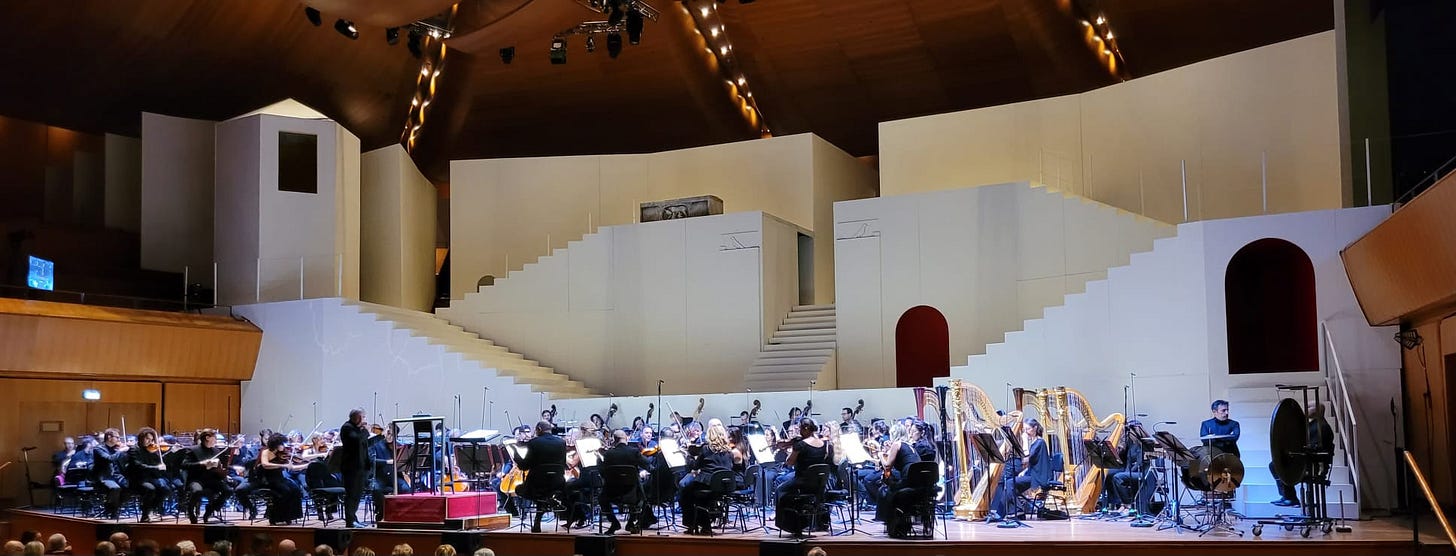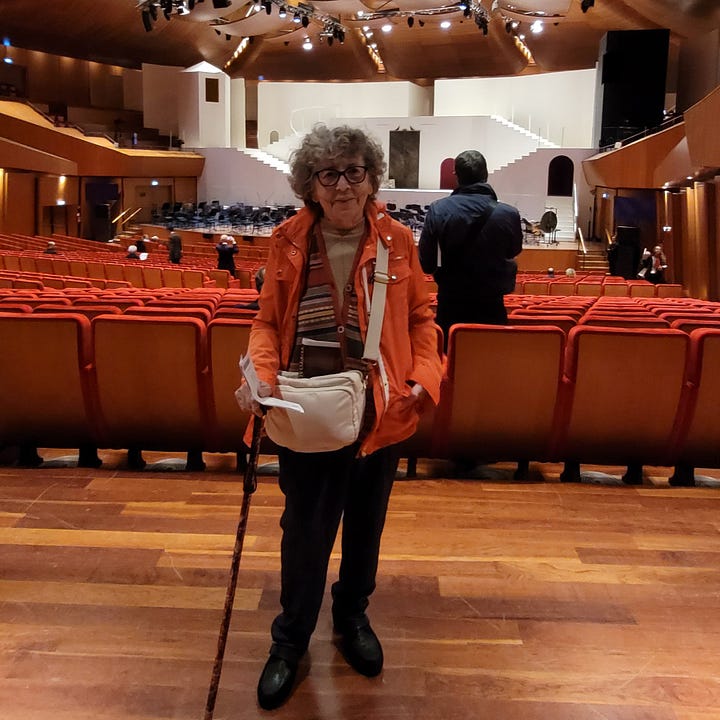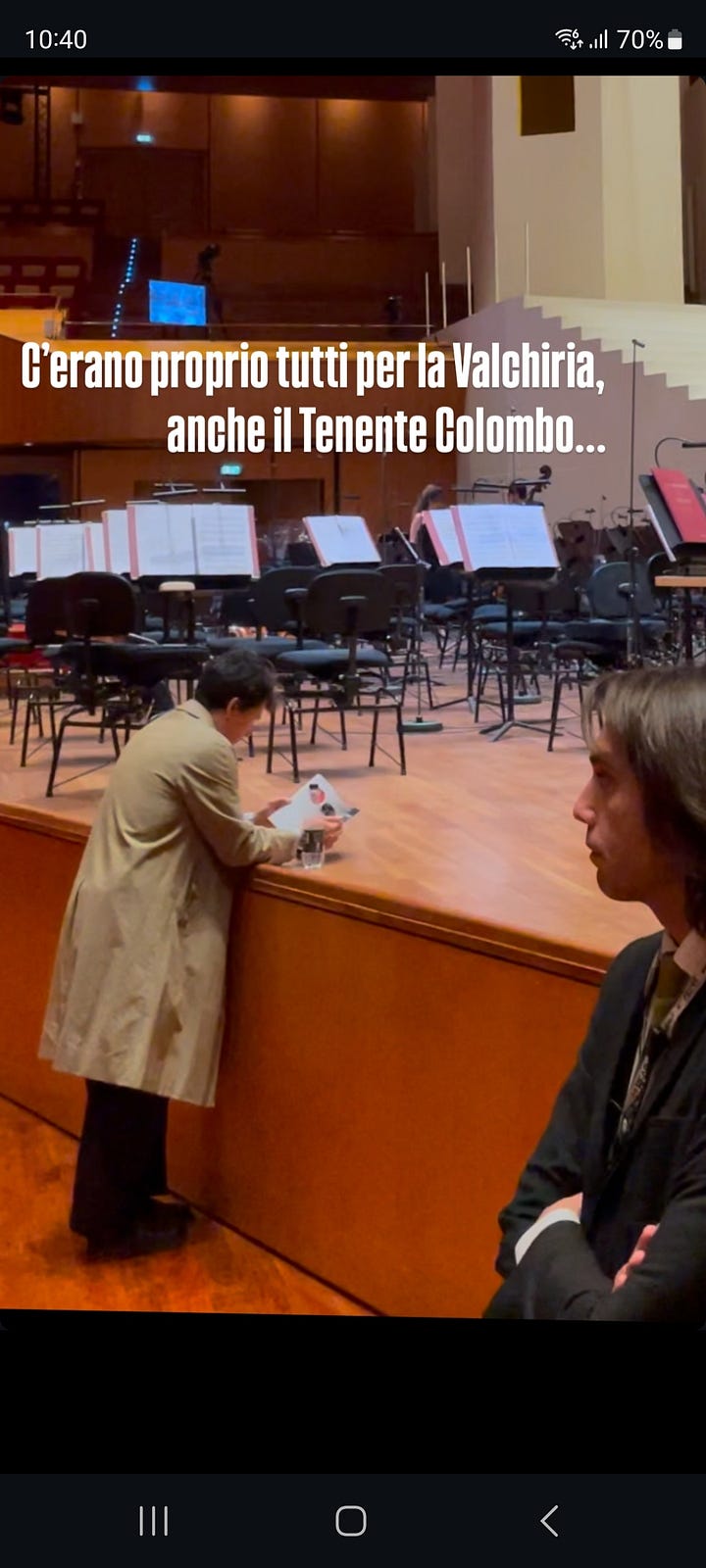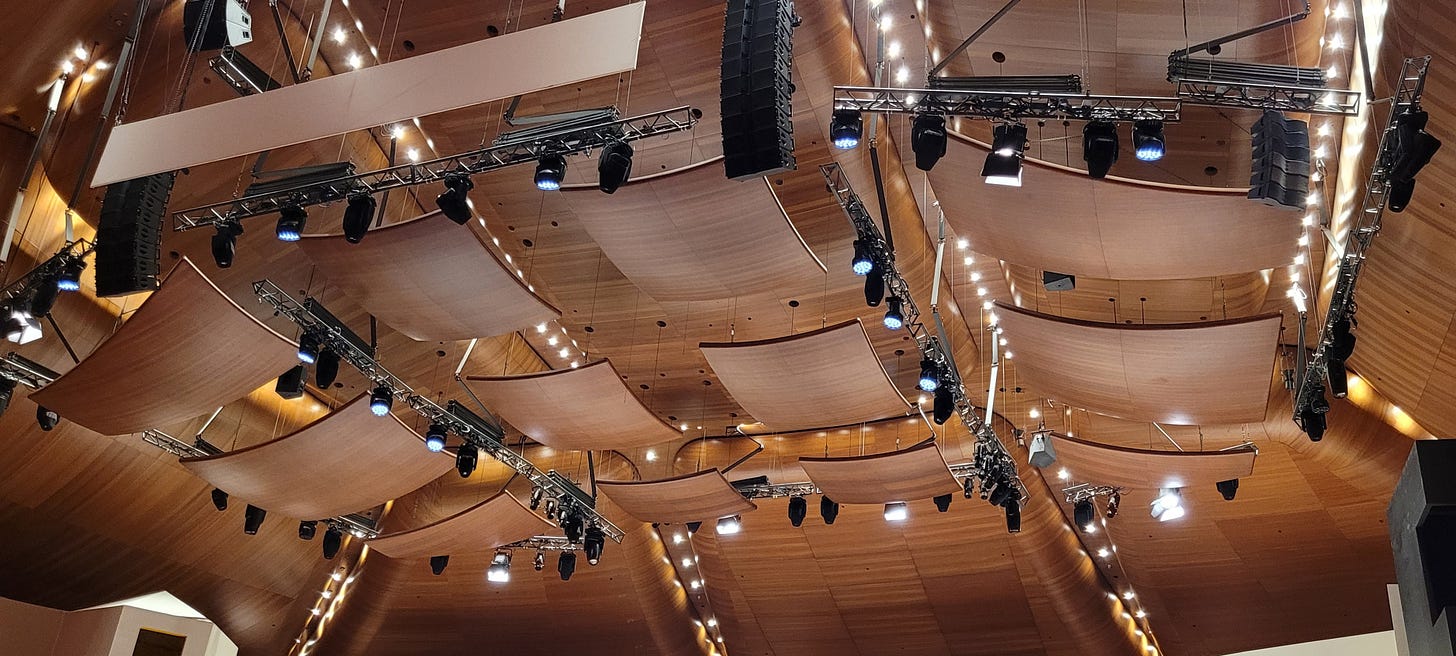I'm Wotan/Wälse/Wolfe, I cause problems
Walhalla hath no fury like a Fricka scorned!
(yes, I’ve changed the name of this newsletter, again.)
I haven’t written about opera for a long time. For many years I've been attending opera performances not just for fun, but also for work — I think I have seen more Don Giovanni performances than allowed by the ICJ.
But then my sister died, and then I was rushed to surgery on a Christmas eve, and then Covid came, and then my Dad died too, and thus only last year I eventually managed to set foot in an opera house again, as Sir William Christie brought Les Arts Florissants to Teatro alla Scala to perform a semi-staged rendition of Purcell's Fairy Queen, which I loved.
Life is what happens while you’d rather be listening to opera instead.
Then a few weeks ago I read that Accademia Nazionale di Santa Cecilia was going to stage Die Walküre: I didn’t think twice, even if Wagner is not exactly my cuppa1, and grabbed the last two available tickets for the only matinée show.

“To stage”: that's what made me get tickets in the first place, because Sala Santa Cecilia, aka Accademia Nazionale di Santa Cecilia's home, is a concert hall, not an opera house (which is where operas are traditionally performed as fully staged productions). But they performed some magic, removing all the terraced seats above the orchestra stage and replacing them with a full scenography, and after Die Walküre this season, they’ll be staging the rest of Wagner's Ring as well, one opera per season until 2028!
I took Mimàdreh along with me…


…and I would totally do that again, but when I told her I was looking forward to the rest of the Ring, Mum replied that, albeit having instantly become a superfan of M° Harding the minute I told her he’s also an airline pilot (“Multi-talented! Bravo!”), next time she’ll probably be busy with a judo class2…
Disclaimer: mind you, this happened over a week ago, on Saturday 25th October, and I’m still recovering from it.
📖 The plot
ACT ONE opens with a dramatic prelude, evoking a storm, but also foreshadowing tragedy — as it should because, duh, this is Wagner.
Then Siegmund arrives chez Hunding and Sieglinde, planning to squat rest there, near an ash tree, not yet knowing that Hunding is an enemy and, above all, that Sieglinde is his long-lost twin sister who’s been forced to marry the enemy. What were the chances?
Sieglinde finds him snoring, and brings him a pumpkin spice latte (or its Norse mythology equivalent) hoping he could save her from her toxic marriage. He tells her “fat chance, I’m an unlucky charm”, she replies “you think you are, but my middle name is Total Loser…”, and they instantly bond.
Enter Hunding, who is taken aback at the suspicious resemblance between his wife and Siegmund…
…and when he discovers he’s one of the Völsung people, he tells Siegmund that he’s welcome to rest, but in the morning they’ll fight. So much for hospitality…
Sieglinde drugs Hunding's evening tea to make him sleep and give Siegmund time to flee, but she also shows him the sword an old man (which was Wälse, aka Wolfe, aka Wotan himself — their Dad!) buried into the ash tree trunk on her wedding day, claiming only a hero can retrieve it. And of course Siegmund can, because he loves her, and she loves him back, both completely oblivious of the consequences of inbreeding…
Siegmund names the sword Nothung, as you do, which means “child of misfortune need”.
•○•○•○•
ACT TWO: enter Wotan, not the fish/man giant from One Piece, but the god of war (and also of other less harming activities which unfortunately are not taken into consideration for this story), father of the jinxed twins, and Brünhilde, a Valkyrie, the title character of this opera, who is also his daughter, but by yet another mother because Wotan was clearly not the god of monogamy.
Although the original memo was “he who gets the sword from the LED tree in act one will prevail”, Wotan now instructs Brünhilde to carry Siegmund to Walhalla, the afterlife club for heroes, because [spoiler] Siegmund must die, as per Fricka's request.
Fricka, who is unrelated to frico, is Wotan's official spouse, and goddess of marriage (the irony! The scorn!), and she is understandably furious not only at Wotan fathering twins with another woman, but also at the aforementioned twins getting too cosy together. That's incest! That’s just unnatural and wrong, so Wotan must stop them! Like, pronto!
At first Brünhilde tries to follow Wotan's orders, but when Siegmund discovers her plan is to take him to Walhalla without Sieglinde, he replies “no way, José!”, thus Brünhilde goes “aww, they're so cute…” and promises him the victory instead.
But Wotan has other plans.
Morning arrives, Hunding and Siegmund fight, and, despite boldly waving Nothung around, Siegmund gets stabbed and dies — after all he’s a tenor, what did you expect?
Wotan is fuming: Brünhilde didn’t follow his orders, and also rode away with Sieglinde — ffs, what is this, Thelma & Louise? So, not knowing what to do with his anger, he breaks Nothung, then goes into super-Saiyan mode and kills Hunding, too, by means of laying on of a hand.
•○•○•○•
ACT THREE opens with the tune from Apocalypse Now the ride of the Valkyries: they’re Brünhilde's sisters, meeting up for brunch on the top of the mountain, Hojotoho-ing left right and centre. They notice that Brünhilde is missing, but then she arrives, together with poor Sieglinde, who’d rather be dead, until Brünhilde tells her that she’s with baby — by Siegmund, of course, and please call him Siegfried, because all these Sieg-somethings weren’t already confusing enough. Sieglinde, not willing to die anymore, runs away into a wood as Wotan arrives, determined to punish Brünhilde — by making her get married with any available thug, who cares?
Her sisters try to hide Brünhilde, but then they run away as well, fearful of Wotan's anger. Once they’re gone, she somehow manages to persuade Wotan, her father, that she did everything for love, knowing that he was suffering for that too. But, albeit being moved and persuaded of her good intentions, Wotan can’t revert his decision: Brünhilde will be playing sleeping beauty on the mountain, surrounded by a circle of perpetual fire until a true hero (so not any available thug, then! Phew!) will be able to pass through it.
Brünhilde begs him, “please, Dad, MAKE SURE HE’S NOT A TENOR!”, then falls asleep.
Magna tranquilla, Bruni’3… or maybe not:
The end (but not really, because this is just 1/4 of the Ring cycle).
👫 The cast
Honestly, they were all astonishing.
In order of appearance…
Jamez (with a z, I'm told it's pronounced “jə-MEZZ”) McCorkle is Siegmund. Look, I often joke about disliking tenors, because I can’t stand way too many characters sung by them (yes, Don Ottavio, that especially means you!), finding them monotonous and lame most of the times — but his Siegmund offered all shades of human emotions: sadness, joy, rage, desperation, softness… it was a roller coaster ride, in a good way.
Vida Miknevičiūtė is a magnificent Sieglinde. Like her “twin”, her character was caught in a whirlwind of emotions, even a panic attack, yet her voice was round and her fraseggio accurate, with her high notes cutting through the ominous atmosphere.
Stephen Milling clearly knows well Hunding, as he’s perfectly at ease with his character, his bass notes booming with a vengeance, and him totally looking as if he was just coming back from some Ragnarǫk episode or something. Scary (and impressive)!
Michael Volle as Wotan is majestic. Always on the verge of exploding with rage — until, well, he did! The building-up of Wotan’s rage was so dense, he carried that on for two acts until it melted into the sadness and tenderness of a father who's lost a son and has to punish a beloved daughter.
Finnish soprano Miina-Liisa Värelä is a fierce Brühnilde (this was her first time singing the role!), whose Hojotoho! warcry made my curly hair go straight (and I think most of the audience's hairdos have been heavily ruffled by it as well). She portayed a loving daughter with a personality, standing by her choices, I totally loved her performance.
Okka von der Damerau's Fricka is anger and noble demeanour rolled into one, her voice never whiny nor shaky when asking Wotan to intervene against Siegmund and Sieglinde.
Loved the Valkyries: Sonja Herranen, Hedvig Haugerud, Claire Barnett-Jones, Claudia Huckle, Dorothea Herbert, Virginie Verrez, Anna Lapkovskaja, and Štĕpánka Pučálková. They were equally playful and powerful as a group, then their voices and acting broke into dread as Wotan's rage became more and more threatening.
The Orchestra of Accademia Nazionale di Santa Cecilia, playing under the bâton of M° Daniel Harding, was equally moving and powerful, bringing all the leitmotifs and the melodies out of the score. (I’ll admit to being partial, here, because they’re my favourite orchestra, so if you ask me they can never do anything wrong!)
I barely know what happened onstage in the last fifteen minutes, because I was weeping through the entire scene. I know this probably makes no sense to anybody else but me, but Wotan being furious at Brünhilde and then softening and bidding farewell to his daughter somehow reminded me of my Dad's latest moments in the hospital, just before he passed away. I haven’t been given the chance to grieve properly, neither for my sister, nor for my Dad, so I took the chance to quietly sob during the last scene of the opera, and because of this I’ll be forever grateful to Michael Volle, to Miina-Liisa Värelä, to Maestro Harding, and to my favourite orchestra, too. Grazie! ❤️
🎭 The staging
Now, this was an absolute first for Santa Cecilia. As I said, the hall was designed and built for concert performances, but Pierre Yovanovitch, who designed the scenography, managed to fit a 500m³ structure behind the orchestra stage (that’s around 654 cubic yards for those of you who still don’t do metrics).
Vincent Huguet's direction was some sort of “minimalism meets ancient Rome”, which is quite the oxymoron, but somehow it worked, albeit with some odd moments (the Valkyries shadow playing with toy horses? And what was the LED animal they were carrying down the stairs? A horse? Didn’t look like one… A she-wolf, perhaps? I’m perplexed…).
The lighting design by Christophe Forey was of surgical precision. The set was almost total white, with the exception of a black tower on the right, the red interiors of Maison Hunding (clearly not following the obnoxious #beigeinteriors trend on Instagram…), and, at its centre, a large, dark door, closed during the first act, hiding the stairway (to heaven?) that came forward for acts two and three. A fallen column (first act) and the costumes recall ancient Rome, and I was mesmerised by the LED ash tree! I promise I’m not being sarcastic about it, quite the opposite: I loved the imagery, I loved it as a graphic sign (very architectural drafting-style).
I’m very much looking forward to Siegfried and Götterdämmerung, wondering how they’ll transform the staging, as I’ve read the former will be set in Papal Rome, while the latter during Mussolini era… who is coming along?

Not because of the music, but… five hours! In German!
“Non importa, sai, ci avevo judo” is a line from the song Tapparella by Elio e le storie tese, and “non posso, ho judo” (“I can't, I have a judo class”) has become the top excuse to avoid social gatherings. Unless you’re a musician, then it’s “non posso, ho le prove” (“I can’t, I have rehearsals”).
= “no worries, Brünhilde…”. Yeah, sure.




The connection between frico and Fricka should be investigated because my grandma (she and granddad had a “palco” at the local theatre as it carries his family name in honor of his ancestor, a musician) always carried a small picnic set at the opera and snacked with champagne all way through.